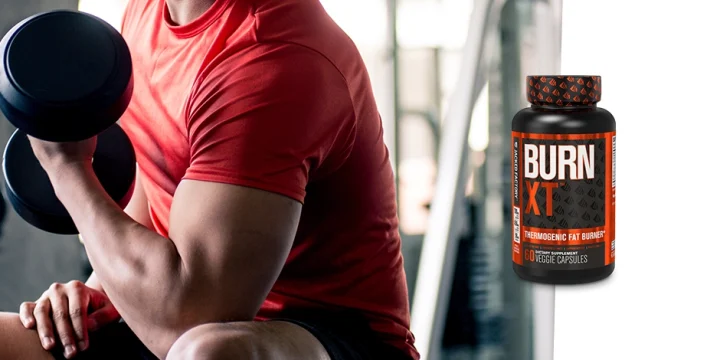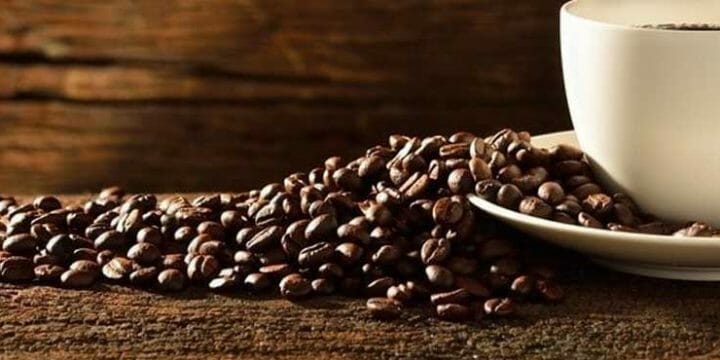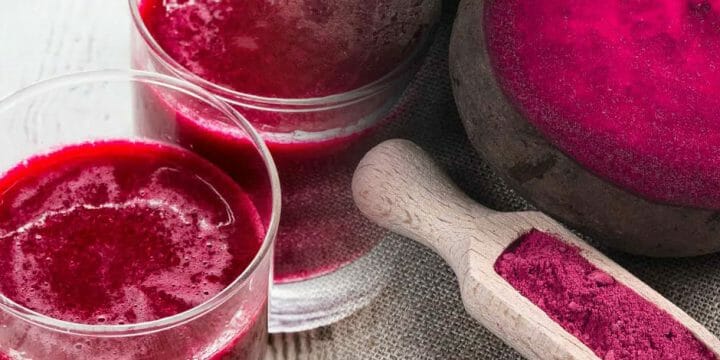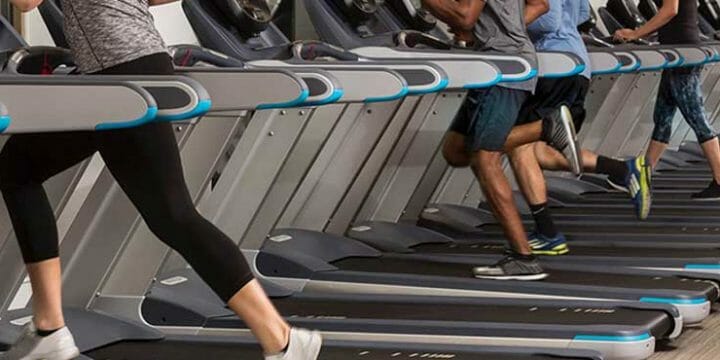With almost a decade’s worth of experience in being a personal trainer, I've tried it all — amino acids, protein powders, creatine. All in order to support my progress in the weight room.
But it was when I started focusing on endurance training that beets (Beta Vulgaris) came on my radar.
Here's everything you should know about taking beets as a pre workout.
Quick Summary
- Incorporating beetroot juice as a pre-workout supplement can significantly enhance aerobic performance due to its high nitrate content.
- Beetroot juice is versatile and can be consumed in various forms, including fresh juice, cooked vegetables, or as a powdered supplement.
- Studies from the MDPI website have shown that athletes who consume beetroot juice experience up to 0.8% better performance in endurance activities like cycling and running.
- Personally, I find beetroot juice to be an effective and natural alternative to synthetic pre-workout supplements, offering a safer way to boost athletic performance.
Is Beetroot Good For Pre Workout?
Yes, beetroot is great pre-workout food.
Nitrate found in beets is metabolized into nitric oxide, which the studies have proven improves athletic performance and has health benefits.
Based on my experience, you can consume beetroot in different ways — drink beetroot juice, cook the vegetable, or take a powdered supplement.
"As an alternative to supplements, beets are a great all-natural source for getting great health benefits that can truly take your athletic performance to the next level."
- Jeff Turbett, a health and wellness coach
Beet Juice Consumption - The Studies
Study #1: Swimmers

The research was done on beet juice supplementation on fourteen male swimmers in their thirties.
They underwent two tests in a swimming pool — with and without beet juice to test their oxygen uptake (VO2) and aerobic energy costs.
The research concluded that swimmers who had taken beet juice before a workout had an increased anaerobic threshold.
According to the exact same study found on the MDPI website, this means they were able to swim longer due to improved oxygen capacity and lower aerobic energy cost [1].
Study #2: High Altitude
Beets are proven to enhance athletic performance under normal environmental conditions, but studies were done to check their high altitude effectiveness.
Working out in high altitudes is more challenging for the body, as oxygen intake is decreased because of the reduction of oxygen pressure.
A study from Canadian Science Publishing involving ten male runners in a simulated high-altitude environment found that while beet juice supplementation increased plasma nitrite concentration to 473 (±226) nmol·L^−1, it did not significantly improve the time to complete a 10-km time-trial, which was 2862 (±233) seconds with supplementation versus 2874 (±265) seconds with placebo [2].
Study #3: Endurance

A systematic review of more than 20 articles was done in order to establish the effect of beetroot juice on cardiorespiratory endurance in athletes.
The review covered both male and female athletes in various sports, such as kayaking, marathon training sessions, swimmers, cyclists, and more.
"The only thing I did differently this year was the beetroot juice."
- Chris Carver, Professional Runner, After Running an Ultra Marathon
The results concluded that athletes who took beetroot before working out had:
- Enhanced aerobic performances
- Kayakers had better oxygen capacity
- Cyclists had a better performance by 0.8% in a 50-mile test
- Runners ran 5% faster in the last part of the race
- All athletes had 60 - 80% longer exercise intensity
The research was done using 70-500 ml of beetroot supplement, which is about 2 cups of beet juice.
The review found that taking beet juice six days before an intense exercise or athletic performance yields better ergogenic benefits [3].
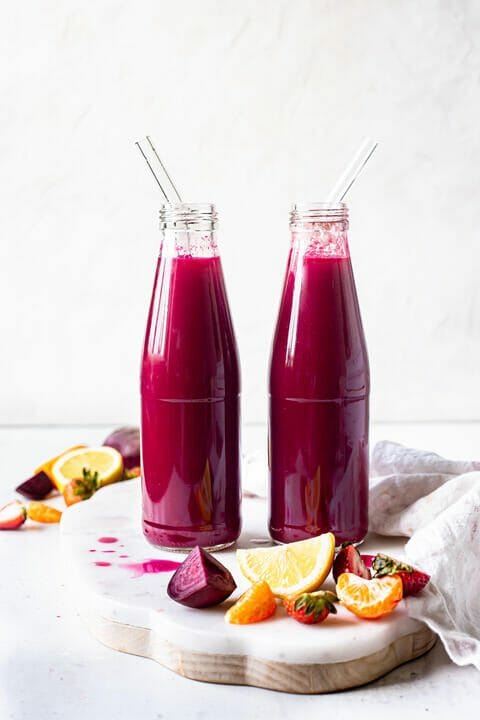
Blender Beet Juice
The content of one research published in the European Journal of Applied Physiology (Eur J Appl Physiol) by Wylie LJ claims there’s exercise benefit during repeated bouts of short duration maximal intensity exercise, with short recovery periods [4].
4 Main Benefits

1. Athletic Performance
What makes beets an excellent pre-workouts choice is their high carbohydrate content. These are easily accessible calories that fuel your body and give it energy.
Beets are also rich in nitrates, which convert to nitric oxide. This can help boost blood flow, which leads to less fatigue, better endurance, and performance.
Same as with other food, timing is everything. If you’re having a heavy meal, eat your food at least three hours before exercising. If you’re having a snack, eat it 30 minutes before working out.
2. Reduces Hypertension
Studies done on hypertension show that beet juice is high in nitrite [5].
When you consume beets or products such as beetroot powder or beetroot extract, nitrate becomes nitric oxide, which relaxes blood vessels and improves blood flow. This decreases blood pressure.
If you’re looking for a low-cost hypertension solution, this could be the answer. Consume 500ml of beetroot juice for the best result.
Additionally derived from dried and ground beetroots, beetroot powder offers many benefits as an adaptable replacement. Smoothies and soups are perfect for blending them in. Or you could mix them into your dough while baking.
Either way, be prepared for a potent dose of beets' beneficial compounds. Aiding in the reduction of hypertension while promoting overall cardiovascular health is achievable with both options - enjoying beetroot juice or utilizing beetroot powder.
3. Anti-Cancer Properties
Based on my research, beets have anti-cancer health benefits. While there aren’t any studies at this time, there is some in vitro evidence that beets have cancer-fighting properties, just as anti-cancer prescription drugs [6].
Betanin — a food dye extracted from beets — can reduce the breast and prostate cancer cells’ size.
4. Anti-Inflammatory
Beets are also rich in betalains, which help reduce body inflammation by limiting enzyme activity which causes inflammation.
Another in vitro study found that beet juice can reduce the risk of heart disease and type-2 diabetes.
Nitrates Importance
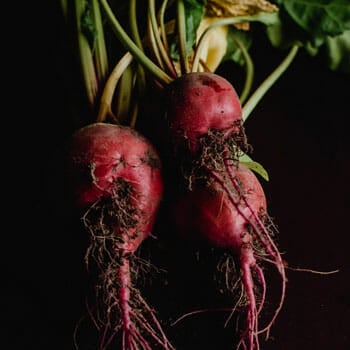
When you think about supplements that can boost your workout, beets are likely not the most obvious choice. But, next to potassium and fiber, they’re also rich in a chemical called nitrate.
Nitrate is found in processed food, such as bacon, which can have carcinogens when smoked and friend.
This is why you should eat beets fresh — chop them in a vegetable salad, or blend in a smoothie, or use them as a supplement product.
“The beetroot juice was effective even without any additional training. It reduces the energy requirements on your muscles so you can last longer."
- Stephen Bailey Senior Lecturer at Exeter University
The body converts nitrate into nitric oxide, which improves lung function, blood flow, and muscle strength.
Nitric oxide (N.O.) is a signaling molecule, which consists of nitrogen and oxygen, and It’s extremely important for relaxing blood vessels. This leads to lower blood pressure and better athletic performance.
Why is it important for athletes? Because it can:
- Prolong aerobic training
- Improve high-intensity interval training
- Reduce the oxygen needed for exertion
Nitric oxide also leads to a better pump and bigger muscles, which is why it’s one of the leading supplements for bodybuilders.
But, if you consider taking pre-workouts, here are the ones we recommend checking out:
FAQs

When should I drink beet juice?
You should drink beet juice two to three hours before exercise for the best results.
Is beetroot good for building muscle?
While there is proof that beets help improve muscle power, there’s no proof that they are good for building muscle.
Do beets help you run faster?
Yes, beets help you run faster. Content of many types of research proved that because beets are rich in nitrate, they help improve running endurance in people.
Do beets improve athletic performance?
Yes, beets improve athletic performance. A vegetable such as a beetroot or spinach, rich in nitrates, can help athletes perform better.
How Does Beetroot Juice Benefit Cardiovascular Health?
Beetroot juice is rich in nitrates, which the body converts into nitric oxide, a compound that enhances blood flow and heart health. Regular consumption can improve cardiovascular efficiency, which is especially beneficial for athletes during intense workouts.
Can Beetroot Juice Help in Managing Blood Pressure?
Yes, beetroot juice can aid in managing blood pressure. Its high nitrate content helps dilate blood vessels, reducing blood pressure and improving overall circulatory health.
What Are the Long-Term Effects of Regular Beetroot Juice Consumption?
Long-term consumption of beetroot juice can lead to sustained improvements in cardiovascular health and exercise performance. However, it's important to consume it in moderation as part of a balanced diet to avoid any potential risks.
How Does Beetroot Juice Compare with Other Pre-Workout Supplements?
Beetroot juice is a natural alternative to synthetic pre-workout supplements, offering performance-enhancing benefits without artificial additives. It's generally safer and provides a gradual energy boost, unlike the immediate but short-lived surge from caffeine-based supplements.
Is Beetroot Juice Beneficial for Post-Workout Recovery?
Yes, beetroot juice can be beneficial for post-workout recovery. Its anti-inflammatory properties and ability to enhance blood flow help in quicker muscle recovery and reduce post-exercise fatigue.
References:
- https://www.mdpi.com/2072-6643/6/2/605
- https://cdnsciencepub.com/doi/10.1139/apnm-2014-0470
- https://www.mdpi.com/2072-6643/9/1/43
- https://link.springer.com/content/pdf/10.1007/s00421-015-3296-4.pdf
- https://www.mdpi.com/2218-273X/8/4/134
- https://www.mdpi.com/2072-6643/7/4/2801
About The Author
You May Also Like

